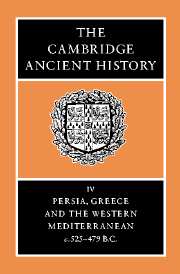Book contents
- Frontmatter
- Contents
- List of maps
- List of text-figures
- List of chronological tables
- Preface
- PART I THE PERSIAN EMPIRE
- PART II THE GREEK STATES
- 4 The tyranny of the Pisistratidae
- 5 The reform of the Athenian state by Cleisthenes
- 6 Greece before the Persian invasion
- 7 Archaic Greek society
- 8 The Ionian Revolt
- 9 The expedition of Datis and Artaphernes
- 10 The expedition of Xerxes
- 11 The liberation of Greece
- PART III THE WEST
- BIBLIOGRAPHY
- Index
- Map 1. The Achaemenid empire
- Map 6. Central Asia
- Map 9. The Black Sea area
- Map 11. Egypt
- Map 13. Greek and Phoenician trade in the period of the Persian Wars
- Map 15. Greece and the Aegean
- Map 18. Northern and Central Italy
- Map 19. Central and Southern Italy
- References
4 - The tyranny of the Pisistratidae
from PART II - THE GREEK STATES
Published online by Cambridge University Press: 28 March 2008
- Frontmatter
- Contents
- List of maps
- List of text-figures
- List of chronological tables
- Preface
- PART I THE PERSIAN EMPIRE
- PART II THE GREEK STATES
- 4 The tyranny of the Pisistratidae
- 5 The reform of the Athenian state by Cleisthenes
- 6 Greece before the Persian invasion
- 7 Archaic Greek society
- 8 The Ionian Revolt
- 9 The expedition of Datis and Artaphernes
- 10 The expedition of Xerxes
- 11 The liberation of Greece
- PART III THE WEST
- BIBLIOGRAPHY
- Index
- Map 1. The Achaemenid empire
- Map 6. Central Asia
- Map 9. The Black Sea area
- Map 11. Egypt
- Map 13. Greek and Phoenician trade in the period of the Persian Wars
- Map 15. Greece and the Aegean
- Map 18. Northern and Central Italy
- Map 19. Central and Southern Italy
- References
Summary
Pisistratus died in spring 527, but tyranny survived at Athens until 510. For most of these seventeen years we have no connected narrative source and a disproportionate amount of our direct evidence is concerned with one day in 514, the day on which Hipparchus was assassinated, and the implications of its events. On these, differing views were held from an early date, most strongly by Thucydides in his most combative mood. A further difficulty is caused by occasional uncertainty as to whether the sources, in statements about ‘the tyrants’ or ‘the Pisistratidae’, intend to exclude or include Pisistratus. This and other ambiguities of the evidence go to obscure the question of whether the tyranny changed its character after Pisistratus' death.
Pisistratus left three legitimate sons, Hippias, Hipparchus and Thessalus (Thuc. VI.55.1 as against Arist. Ath.Pol. 17.3). Of Thessalus little was known and the accounts of his character are contradictory and worthless (Arist. Atb.Pol. 18.2, Diod. X.17.1). There is now general agreement that Hippias and Hipparchus were well into their forties at their father's death, but no certainty is possible as to which was the elder. Thucydides (1.20.2, VI.55.1–2) was sure that it was Hippias and that the general Athenian belief, preserved only by Plato (Hipparch. 228b) and possibly by the Parian Marble (45), that it was Hipparchus was mistaken. The evidence with which he supported the oral tradition which had reached him is not convincing, and a further difficulty arises from the archon-list fragment, shortly to be considered, which shows Hippias as archon in 526/5.
- Type
- Chapter
- Information
- The Cambridge Ancient History , pp. 287 - 302Publisher: Cambridge University PressPrint publication year: 1988
References
- 17
- Cited by

